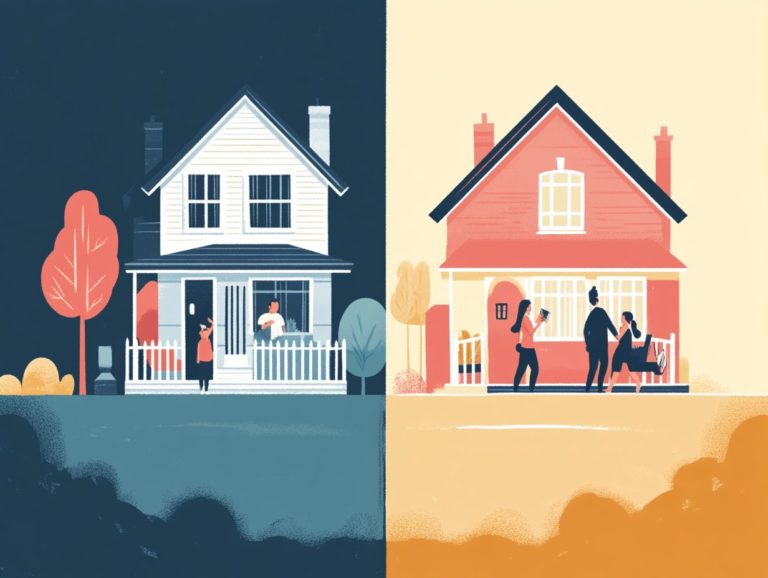How to Choose the Right Home Insurance?
Home insurance is essential for safeguarding your most valuable asset your home.
With a variety of policies available, it s easy to feel overwhelmed by the intricacies of home insurance. This article will walk you through the essentials, from what home insurance includes to the different types of policies available.
You’ll discover key factors to consider, such as location risks, coverage requirements, and potential discounts that can save you money. You ll also find helpful tips to help you select the right policy tailored specifically to your unique circumstances.
Jump in to protect your home now!
Contents
- Key Takeaways:
- Understanding Home Insurance
- Factors to Consider when Choosing Home Insurance
- Location and Risks
- Coverage and Deductibles
- Cost and Discounts
- How to Determine Your Coverage Needs
- Evaluating Your Assets and Risks
- Tips for Choosing the Right Home Insurance
- Frequently Asked Questions
- What factors should I consider when choosing the right home insurance?
- How do I determine the appropriate coverage for my home insurance?
- What is the difference between replacement cost and actual cash value in home insurance?
- Are there any discounts available for home insurance?
- What is the claims process for home insurance?
- What should I do if I want to switch my home insurance policy?
Key Takeaways:

- Understand different types of home insurance policies.
- Consider factors like location, coverage, and cost.
- Evaluate your assets and calculate replacement costs for adequate coverage.
Understanding Home Insurance
Understanding home insurance is crucial for you as a homeowner. It means making smart choices about your money regarding the protection of one of your most significant investments: your home. Knowing how to compare home insurance policies can help ensure you choose the right coverage.
Home insurance offers coverage options that shield you from various risks, including property damage from weather events, crime, and other hazards.
Look at different insurance companies to compare their policies, premium costs, and customer satisfaction ratings. Understanding the claims process is important. Coverage amounts and available discounts can greatly influence your overall experience with your insurance provider.
What is Home Insurance?
Home insurance is an essential safeguard for your home and personal belongings, designed to protect against a variety of risks and damages.
This critical coverage acts as a shield against potential incidents like fire, theft, or natural disasters, ensuring that both your dwelling and its contents remain secure. It typically includes property damage, which covers repairs or replacements, as well as personal liability, which protects you if someone gets hurt on your property.
With a range of coverage options available, you can tailor your policy to suit your specific needs. The claims process helps facilitate compensation for losses, helping you regain your peace of mind after unexpected events.
Types of Home Insurance Policies
You ll find a variety of homeowners insurance policies, with the HO-3 policy standing out as one of the most popular. It s designed to offer extensive coverage for property damage and personal liability.
This policy typically shields you from a broad spectrum of perils, including fire, theft, and certain natural disasters. Depending on your unique needs, there are other options to consider.
- For instance, the HO-1 policy provides basic coverage for specific hazards, making it a fitting choice if you re working with a tighter budget.
- On the other hand, the HO-2 policy offers broader coverage than HO-1, encompassing additional risks.
Carefully assess your situation to find the best policy for you and ensure adequate protection for your assets.
Factors to Consider when Choosing Home Insurance
Selecting the ideal home insurance demands thoughtful consideration of various factors. For guidance on this process, consider how to choose the right home insurance by thinking about your location, associated risks, coverage options, deductibles, and overall costs, all aimed at ensuring your property is adequately protected.
Elements like local crime rates, the likelihood of severe weather events like hurricanes or tornadoes and specific features of your home can greatly impact your insurance requirements.
By grasping the connection between insurance costs and available discounts, you enable yourself to make informed decisions, ultimately enhancing your satisfaction as a homeowner.
Location and Risks

Your home’s location greatly impacts the risks associated with your insurance. Factors like crime rates and weather events can influence your coverage needs.
In areas susceptible to severe weather, such as hurricanes or flooding, the likelihood of property damage rises. This makes specialized coverage a necessity.
If you live in a region with high crime rates, it might be wise to invest in enhanced security measures like alarms and surveillance systems. These features not only provide peace of mind but can also lead to reductions in your insurance premiums.
Assessing these factors thoughtfully is essential. Understanding the unique risks tied to your specific location empowers you to make informed decisions, ensuring you have the right protection against unforeseen events.
Coverage and Deductibles
When selecting a home insurance policy, understanding your coverage options and deductible choices is essential. For tips on maximizing your savings, check out this guide on how to find the best home insurance deals, which ensures you have adequate protection against potential losses and liabilities.
Home insurance typically provides various types of coverage:
- Dwelling protection, safeguarding your home s structure.
- Personal property coverage for your belongings.
- Personal liability protection that shields you from legal claims arising from injuries or damages.
Many policies also cover additional living expenses, offering financial support for temporary relocation if your home becomes uninhabitable due to a covered risk.
It’s crucial to consider how your choice of deductibles impacts premium costs. Generally, higher deductibles result in lower premiums, but they can significantly affect your out-of-pocket expenses during the claims process. Striking the right balance between deductibles and coverage is vital for your overall financial security.
Cost and Discounts
The cost of home insurance can vary greatly depending on several factors. Exploring available discounts could lead you to more favorable premium costs.
Your location is a significant factor in determining these rates. Depending on where you live, you might face varying risks, from natural disasters to different crime rates. Additionally, the overall value and condition of your property are crucial in calculating your premium; typically, a higher replacement cost translates to higher coverage.
Your previous claims history is another critical aspect to consider. A record of frequent claims can indicate increased risk, possibly resulting in elevated costs. Fortunately, many homeowners can capitalize on various discounts.
- For instance, bundling multiple insurance policies can lead to better deals.
- Installing a comprehensive home security system enhances safety and might also reduce your insurance costs.
Customer feedback on claims handling provides valuable insights that can influence your decisions as a policyholder in the future.
How to Determine Your Coverage Needs
Determining your coverage needs demands a meticulous risk assessment. This involves evaluating your home inventory, grasping replacement costs, and accurately estimating your property value. Before proceeding, it’s crucial to understand what you should do before buying home insurance. By doing so, you can ensure that you are thoroughly protected.
Evaluating Your Assets and Risks
Evaluating your assets and risks is crucial for determining the right level of coverage for your home insurance policy. Before diving into this process, consider what you should do before getting home insurance. This involves taking a detailed inventory of your belongings, paying close attention to their current value and condition.
You also need to assess your property for potential vulnerabilities, such as risks from natural disasters or theft. Systematically identifying these factors can uncover coverage gaps that might leave your assets exposed.
Understanding the specifics of your existing insurance policies is essential. Many may not cover the full value of high-ticket items or might come with exclusions that could affect your asset protection.
Regular assessments are key to ensuring that your coverage evolves with your lifestyle and addresses the unique risks that come with your location.
Calculating Replacement Costs

Calculating replacement costs means determining how much it would take to fully replace your home and belongings in the unfortunate event of a total loss. This ensures that you have adequate insurance coverage in place.
This estimation takes into account current construction costs, materials, and labor. It gives you a thorough understanding of what it would genuinely require to rebuild.
In contrast, the actual cash value considers depreciation. This means that as your items age and wear, the payout may decrease.
Understanding these distinctions is crucial for you as a property owner. The right calculations can prevent underinsurance, ensuring you’re ready when challenges arise.
As property values shift, staying informed about the current market can significantly affect your insurance premiums and the claims process. Ultimately, this influences how smoothly your recovery unfolds after a disaster.
Tips for Choosing the Right Home Insurance
Selecting the ideal home insurance requires careful research and comparison of various policies.
You should aim to identify the option that best suits your unique needs while placing a premium on exceptional customer service and satisfaction.
Research and Compare Policies
Researching and comparing different home insurance policies is essential for you to discover the most suitable coverage options available for homeowners. By taking the time to understand the various insurance products on the market, you can refer to this guide on how to find the best home insurance for your needs and make informed decisions that best protect your assets.
It’s vital to consider factors such as the extent of coverage offered, the amount you pay out of pocket before insurance kicks in, and overall premiums. This ensures that the policy aligns perfectly with your specific needs.
Look for discounts for bundling policies or maintaining a claims-free record. This enhances affordability and ensures comprehensive protection for your home.
Read Reviews and Ask for Recommendations
Reading reviews and seeking recommendations from friends, family, or local agents can provide you with invaluable insights into customer satisfaction and how various insurance companies handle claims.
Understanding these perspectives is essential, as they shed light on the efficiency of the claims process and reveal the level of support policyholders receive during stressful moments.
By learning from the experiences of others, you can identify patterns in service quality, responsiveness, and overall trustworthiness. This insight enables you to make informed decisions that ultimately safeguard your home and finances.
Consistent positive feedback often signals that a particular insurer prioritizes customer service and satisfaction two critical factors in the often-overlooked journey of selecting home insurance.
Frequently Asked Questions
What factors should I consider when choosing the right home insurance?

When choosing the right home insurance, it is important to consider the coverage and deductibles offered, the reputation and financial stability of the insurance company, and the cost of the policy. For more guidance, check out this resource on how to find the best home insurance type.
How do I determine the appropriate coverage for my home insurance?
The coverage needed for your home insurance will depend on various factors, such as the value of your home, the cost of rebuilding or repairing it, and the possessions you want to protect. To better understand how to evaluate your home insurance needs, it is recommended to consult with an insurance agent to determine the appropriate coverage for your specific needs.
What is the difference between replacement cost and actual cash value in home insurance?
Replacement cost coverage will reimburse you for the full cost of replacing or repairing your home or possessions, while actual cash value coverage will factor in depreciation and reimburse you for the current value of your home or possessions.
Are there any discounts available for home insurance?
Yes! Many insurance companies offer discounts. Common factors include having a security system, bundling your home and auto insurance (which means combining your policies for a discount), or being a non-smoker.
Don t forget to ask your insurance provider about discounts when choosing your home insurance!
What is the claims process for home insurance?
If you need to file a claim, start by contacting your insurance provider. Gather the required documents, and they will assess your claim.
After you submit your claim, the insurance company will determine your coverage and reimbursement amount.
What should I do if I want to switch my home insurance policy?
If you want to switch your home insurance, shop around for quotes from different companies. Once you find a suitable policy, cancel your current one and switch to the new policy.
Act quickly to avoid any gaps in your coverage during this process!




